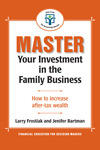Special Report DAC 2009: Mastering the Family Business
 |
"An opportunity exists to blend the unique benefits of a family business with the strengths of a market driven business, providing the basis for greater wealth creation for the family over a longer period of time."
Jenifer Bartman, speaking at the
2009 Distinguished Advisor Conference in Tucson, Arizona |
 |
|
|
|
Small to medium sized businesses make up a significant portion of Canada's business community and account for a large portion of the country's economic activity. Most people either know someone who runs a business, owns a business, or may be a business owner themselves. People may be employed by a business that is owned and/or managed by an independent group of parties, or perhaps it is owned by an individual or family. Sometimes businesses start off as closely held family businesses that later become more widely held, perhaps by parties including the original owners, or even by parties independent of the founder.
Some businesses stay small; some grow moderately, while others grow to become very large businesses, even with operations spanning a number of countries. Some businesses operate for a period of time, experience moderate growth, and then fade into decline. Others, sadly, are wound up and no longer exist, often when the owner retires. Performance, profitability, and value can vary significantly from business to business, with some companies being sought after by customers, partners, and potential acquirers. Others go virtually unnoticed.
Why do some businesses become the recognized name or ìprovider of choiceî within their industry, while others fall to ìcommodityî status? Why do some companies remain strong throughout the years, perhaps even over generations, while others flounder when the original driving forces behind the business are no longer involved?
Consider the following:
Some family businesses exist solely to meet the economic needs of the family unit. The founder generates business within his or her network and does not have any significant initiative to grow beyond this point, so long as the family's economic needs are met. This type of business can be referred to as a Lifestyle Family Business.
Some family businesses are opportunity driven, in that the founder wishes to identify unmet needs or areas of potential within the marketplace and seek to position the business to meet and benefit from these needs. The founder is motivated to grow the business beyond the current economic needs of the family and may be driven by factors other than basic economic need, such as being the best provider in their industry. This type of business can be referred to as a Market Driven Family Business.
Many family business leaders have never considered their business in this context, including the risks and rewards associated with each category. The challenge is attaining Market Driven Family Business status, and understanding what is required to successfully operate at this level.
Jenifer Bartman is a Knowledge Bureau faculty member and is a co-author of MASTER Your Investment in the Family Business ñ How to Increase After-Tax Wealth.